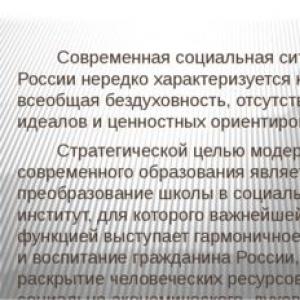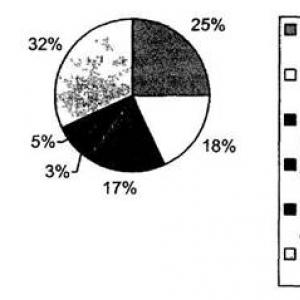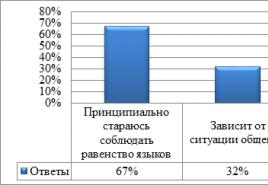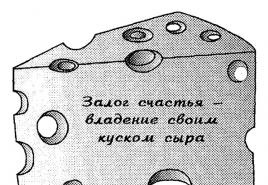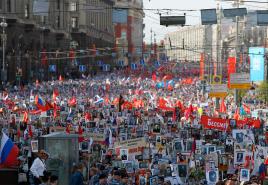Interesting facts about the block. Interesting facts about A.A. Blok
Alexander Blok, interesting Facts from the life of which are given in the article - one of the most famous
It all started like this
In the house of the Beketovs, where the future poet spent his childhood, poetry was loved and appreciated. They were written by the family, some jokingly, some seriously, almost everyone. In this regard, we can cite the first interesting fact from life and. According to the poet, the test of the pen refers to approximately five years of age. Little Sasha wrote short poems, stories, which he carefully, in block letters, copied into albums. In the latter, everything was as expected: table of contents, vivid drawings. The boy dedicated almost all the children's "collections" to his mother, as evidenced by the inscriptions he made.
At the age of nine, Sasha began to "publish" the monthly magazine "Ship", which could fit in an ordinary notebook. Later, in the 94-97-ies, "was the editor" of the home handwritten "Bulletin", in the publication of which all relatives participated. By the way, there were quite a few young Blok here. But Alexander began to take creativity seriously only at the age of eighteen. At that time, there were already about eight hundred poems in his "piggy bank".
Interesting facts from the life of Blok: gymnasium
From the very birth, the Beketovs protected Sasha from everything bad that happened around. Therefore, admission at the age of eleven to the Vvedenskaya gymnasium, located on the outskirts of St. Petersburg, became a real horror for him. From a calm, friendly home environment with talks about art, he came to a place with a crowd of loudly shouting shorn boys. The teachers also made a painful impression on the neat and well-mannered Sasha. It was no accident that after the first day of his stay in the gymnasium, he said that people most of all struck him. Subsequently visit educational institution turned into a duty for the boy, and the first friends appeared only in Such interesting facts from whose life help to look at him as an ordinary person.

The poet's first love
All lovers of Blok's creativity know about his wife, L. D. Mendeleeva, to whom the collection "Poems about the Beautiful Lady" was dedicated. But not everyone knows that the first muse of the poet was not she, but thirty-seven-year-old K. M. Sadovskaya.
Their acquaintance took place in Bad Nauheim, a German town, where a seventeen-year-old boy arrived with his mother and aunt. For a month, before K. Sadovskaya's departure, Alexander bought her roses every morning and accompanied her everywhere. This romance continued in St. Petersburg and lasted until, in August 1998, Blok inflamed with passion for Lyubochka Mendeleeva. And although in November of the same year in one of the poet's poems there will be lines about the "mistress, long forgotten", their correspondence, mainly boiling down to clarifying the relationship, will continue until the summer of 1901. After August of this year, they no longer saw each other and did not communicate. And in 1909 the poet again found himself in Bad Nauheim, where, as a memory of his former hobby, the cycle of poems "Twelve Years Later" was born. These are interesting facts from Blok's life associated with his first crush.

Poem "Twelve"
Blok accepted the revolution with enthusiasm. And even when his beloved Shakhmatovo was burned down, he told everyone who expressed regret and sympathy that it should be so. And he added: a poet should not have property. Full of hope for the future, on January 8, 18th, he sat down at “Twelve. He worked all day, after which there was a long break. Finally, on January 27-28, the work was completed, and Block wrote: "Today I am a genius."
Here you can cite interesting facts from the life of Blok related to the perception of the poem by his contemporaries. So, the soldiers and workers, before whom Blok personally read the work, were filled to tears and violently expressed their delight. Although it should still be noted that later the commissar, who headed the Theater Department, advised the poet to do without public recitation - he associated this with the image of Christ.
However, almost the entire intelligentsia, including people close to the poet, took up arms against him and did not even shake hands when they met. And Z. Gippius, who had previously been on friendly terms with Blok, wrote down his name as the second in the list of traitors and defectors who were “not people” for her. A little later, in May, she sent the poet her new collection, imbued with hatred of the Bolsheviks, in which she enclosed a leaflet with the poem “Blok. The child lost by all ... ". The poet wrote her answer in a similar form on the last page of the little book with "Scythians" and "Twelve". When in 1921 Blok was advised to go abroad for treatment, one of the reasons for his refusal was that he could meet Russian emigrants there.
The phrase thrown by Kolchak when he learned about the correspondence between Blok and Gorky is also indicative. Both are talented, but when they both meet, they will have to hang - that is its meaning.

Last performance
In numerous articles citing interesting facts from the life of Blok, the evening organized in his honor by the House of Arts is surely mentioned. This happened on April 25, 1921. About two thousand people gathered in the Bolshoi Drama Theater. The evening was opened by K. Chukovsky. In his speech, he called Blok the greatest of his contemporaries, which caused the poet's discontent: "How do I go on stage now?"
Alexander Alexandrovich appeared before the public thinner, gloomy, in black clothes. And only at the very end, before reading the poem "The girl sang in the church choir ...", he appeared with a white flower in his buttonhole.
All evening his voice, which was perfectly heard in all corners of the hall, sounded low and distinct. The spectators, feeling the special significance of the evening, left without haste. And against the background of general silence, the prophetic phrase sounded: "This is some kind of commemoration." In fact, the Petersburgers never saw Blok speaking anymore: from mid-April his condition worsened from an incomprehensible illness.

Concerts in Moscow
It was early May. The poet felt bad, but he did not cancel the planned trip. Difficult, with a stick, going on stage. Reading poetry through force. Often a stranger in spirit, sometimes even a hostile audience. Alexander Blok spoke in such conditions - interesting facts from life famous people sometimes associated with the fact that, perhaps, for the hero of the story was unpleasant. So, during one of the Moscow performances, the poet heard in his address: "Yes ... these are the poems of a dead man!" They were pronounced by A. Struve, who thus decided to settle old scores with Blok. Alexander Alexandrovich did not argue, but only calmly said: "Yes, I am a dead man." And he recalled his trip as a nightmare and a difficult dream. He still had two agonizing months ahead of him and the realization that he was dying.
Such an extraordinary person was Aleksandr Aleksandrovich Blok, interesting facts from the life of which are given on the basis of VN Orlov's book "Gamayun (the life of Aleksandr Blok)".
30.01.2016
Alexander Blok was born into a family where everyone either wrote poetry, translated, or were simply very interested in art. From childhood, the boy heard conversations about music and literature. He himself felt a penchant for writing at the age of 5. At least that's when he spoke in poetry. Rhymes then accompanied him throughout his life. And what was the "personal space" of the talented poet? What was Blok like in relations with loved ones, with his earthly muses, with friends? What interesting facts was Blok's life filled with?
- Blok first experienced a real explosion of love feelings at the age of 17. He went with his mother to a resort, where he decidedly did not know what to do with himself. On the same days, fate threw the 37-year-old beauty Ksenia Sadovskaya into the same resort town. It was a lady in full bloom of mature beauty. A fiery feeling instantly flared up in the heart of the young Blok. Xenia, at first condescending to the boy, soon answered him in return. The romance lasted 4 years.
- When the time came for Alexander to think seriously about his studies, he chose jurisprudence and even honestly tried to master this science at St. Petersburg University. But the poetic side of nature prevailed: after a while, Blok realized that he would not be a lawyer, and transferred to the Slavic-Russian department.
- At first, Blok took the revolutionary events with enthusiasm. He shared the ideals of the revolutionaries, even took part in the work of the Extraordinary Commission to investigate the crimes of the tsarist regime. However, in 1919 Blok himself almost suffered from the new government, which he zealously defended and justified. He was arrested on suspicion of conspiracy against the government. Lunacharsky's intervention saved Blok's life: a day and a half later he was released. Over time, the poet begins to rethink his attitude to political and social change. He comes to a sad conclusion: with the new power he is not on the way.
- Blok considered Lyubochka Mendeleev's only true love. He was familiar with her, the daughter of a famous chemist, from the most "tender" years - either from 4, or from 3 years of age. As adults, young people realized that they were connected not only by friendly feelings. Blok idolized Lyuba. Once he made her an offer, which the girl readily accepted. But they did not have happiness: fearing to “stain” the purity of his young lover, to defile her with a rough physical touch, Blok managed to leave their relationship platonic. He knew how to admire his Muse and idolize her, but only as long as she was an unattainable air angel for him. For the young wife, this role of the ethereal Muse of the poet turned out to be too difficult.
- The couple lived apart for a long time, going through one novel after another, but at the same time they maintained friendly relations and corresponded, telling each other about all the events in their lives and morally supporting each other. Only during the period of Blok's fatal illness did they begin to live together again, and Lyubov devotedly looked after her husband, got him food and medicine in impoverished hungry Petersburg.
- The poem "Twelve", created by Blok at the height of revolutionary enthusiasm, did not find understanding either among the Bolsheviks or among the "old guard". Everyone was amazed by the "out of nowhere" image of Christ, leading 12 fighters determined to destroy the old world at any cost. Blok declined to explain this image. He said that he himself did not expect to see Christ here, but he saw him clearly. This means that Jesus should have appeared in the poem - it did not depend on the will of the author.
- When Blok lived in post-revolutionary Petersburg, the news of the death of his first ardent love, Ksenia Sadovskaya, reached him. He responded with dismissive verses about the "death of the old woman." Meanwhile, the real Sadovskaya was still alive and lived not far from him. Gathering her strength, she went to her son in Odessa, fleeing hunger. And there she immediately ended up in a hospital for the mentally ill. Doctors read her poems dedicated to her by Blok many years ago. The old woman cried the first time she listened to them. When she died, no inheritance remained after her, except for a bundle, at the bottom of which were Blok's letters carefully tied with a ribbon ...
All his life Alexander Blok admired the Beautiful Lady of his dreams - and only at the end of his life he realized that this Lady could, but did not want to bring simple earthly, human happiness. This lady was Lyubov Mendeleeva. At first, Blok warmly supported the revolution with all his heart, and then became completely disillusioned with it and demanded, in dying anguish, to destroy all copies of the Twelve. Life brought him a full cup of bitter disappointment. Friends believed that it was from grief and absolute despair that the poet died, barely reaching 41, and not at all from "heart disease", as the doctors wrote in the conclusion ...
On August 7, 1921, the main poet of the Silver Age, Alexander Blok, died of inflammation of the heart valves. Talking about his works is superfluous, they need to be read, so we give ten of the most curious facts from the biography of this poet
Alexander Blok was born on November 16, 1880. He lived a short time - he died when he was only 41 - but a rich life, forever securing the glory of a genius and one of the brightest poets of the Silver Age. His works: dramatic, poems, cycles of poems - are still enmeshed in the controversy of critics, symbols, signs, hints, pervading his works, make them relevant today. We remember the most interesting milestones in his life.
A few months before his death, the poet, as usual, read his poems at the Bolshoi Drama Theater. Before his speech, Chukovsky took the floor, saying a lot of good things about Blok, after that Blok himself read his poems about Russia. As his contemporaries later recalled, the atmosphere was too solemn and sad, and one of the spectators breathed out an almost prophetic phrase: "This is some kind of commemoration!" This was his last performance on the stage of this theater.
In February 1919, Blok was arrested for a day and a half. He was suspected of conspiring against the Soviet regime. But then Anatoly Lunacharsky put in a word for him, and the poet was released.
Blok was married to the daughter of the famous chemist Dmitry Mendeleev. They had known each other since childhood, the scientist was on friendly terms with the poet's grandfather. Feelings for Lyubov Mendeleeva were so sublime that Alexander Blok for a long time was afraid to spoil them, to discredit them with carnal relationships. It was her image that formed the basis of "Poems about the Beautiful Lady".
Alexander Blok was credited with an affair with Anna Akhmatova. However, after the death of the poet Akhmatova repeatedly returned to this topic in her memoirs, dispelling all rumors about "a monstrous passion for Blok."
Before his death, Alexander Blok raved for several days. Almost in an unconscious state, he only remembered one thing: were there by chance copies of his poem "The Twelve". The poet wanted to completely destroy it.
Perhaps the most famous poem by Blok "Night, street, lamp, pharmacy ..." on Leiden Street in the Netherlands is captured as a monument - written on the wall of one of the houses within the framework of the world project "Wall poems".
In the jubilee years, postage stamps appeared with the image of the poet.
1980 postage stamp
Asteroid 2540, which was discovered in 1971, was named Alexander Blok.
If you believe the questionnaire that Blok filled out in one of the sanatoriums where he had to rest, he had a passion for beer and ice cream.
Alexander Blok wrote his first poems at the age of five.
Many of Blok's works could never have been born, and the years of the poet's life would be noticeably reduced, if not for the case. The poet was friends with the artist Sapunov, and at the beginning of April 1912 the artist invited him and his friends to rest in a fishing village. The block could not keep them company. Fortunately. One of the nights, friends went for a boat ride. But the boat capsized. Sapunov drowned because he could not swim. Block, by the way, could not swim either. Therefore, his fate could have been the same if he were there.
The life of Alexander Blok, born on November 16, 1880, was short-lived. The poet lived only 41 years, but his life fell on a very important period for Russia. Blok became the recognized genius of the Silver Age. His works - poems, poems - still evoke an ambiguous reaction and controversy among literary critics.
Not only Blok's works are interesting - his life was also very interesting. Here are the most curious facts from the poet's life:
1. During another performance by Blok at the Bolshoi Drama Theater, a few months before his death, the poet read poems about Russia. The preface to its publication was the opening speech of Chukovsky, who paid tribute to the talented poet. The atmosphere of the poetry readings turned out to be very solemn and even sad, and from the ranks of the spectators it was clearly sounded: "This is some kind of commemoration!" Unfortunately, the phrase turned out to be prophetic: Blok never again appeared on the stage of this theater.
2. In the winter of 1919, Blok was arrested. He was detained for a day and a half on suspicion of conspiracy against the revolutionary government. They released him at the request of Anatoly Lunacharsky.
3. Blok's wife was the daughter of an outstanding chemist Dmitry Mendeleev. The future spouses met in childhood. The poet had such lofty feelings for Lyubov Mendeleeva that for a very long time the relationship did not go beyond the platonic one. It was she who became the prototype of the Beautiful Lady.
4. For a long time it was believed that Blok and Anna Akhmatova had an affair. However, after the death of Blok, Akhmatova herself repeatedly denied these rumors in her memoirs.
5. Before his death, the poet was delirious for several days. And one of the obsessive thoughts that tormented him was the thought of whether he destroyed all copies of the poem "Twelve". The poet wanted not one of them to remain.
6. One of the most famous poems of the Bloc "Night, Street, Lantern, Pharmacy" was immortalized as a monument in Leiden, the Netherlands. During the implementation of the "Wall poems" project, it was painted on the wall of one of the houses in the city.
7. The name of the Block named one of the asteroids discovered by astronomers in 1971.
8. About the addictions of the poet became known from the questionnaire, which he filled out during his stay in one of the sanatoriums: this is beer and ice cream.
9. Blok was only five years old when he wrote his first poems.
10. Blok could have ended his days much earlier - in 1912. Once his friend, the artist Sapunov, went to rest in a small fishing village and invited several friends, including Blok, with him. However, the poet could not go. The company, having arrived on vacation, went for a boat ride at night. The boat capsized, everyone was in the water, and Sapunov, who could not swim, drowned. The same fate could have awaited Blok, who also did not know how to swim.
Blok's work, like his biography, is unique. The fate of the poet intertwined with historical eventsthat took place at the turn of the XIX and XX centuries. Historical trends are vividly reflected in his lyrics. In place of light symbolism, filled with romance, through Blok, realism comes to poetry with its heavy tread.
Brief biography of Blok. Young years
Before proceeding with the analysis of the poetry of Alexander Blok, the features of his work, it is useful to pay attention to the biography of the poet. Blok was born on November 16, 1880. The mother of the poet Alexander Beketov left the family immediately after the birth of her son due to a difficult relationship with her husband, Alexander Lvovich Blok. In 1889, she married a Guards officer and settled with a baby on the banks of the Bolshaya Nevka in the vicinity of what was then Petersburg.
Blok himself began to write poetry at the age of five. At the age of 9 he was sent to study at a gymnasium, where he remained until 1898. In 1897, the future poet experienced his first love. Ksenia Sadovskaya turned out to be the object of young Bock's passion. His feelings did not fade for several years, which gave rise to several lyric poems. At the age of 17, Blok became interested in theater. The poet seriously intended to become an actor. In 1989, he met Lyubov Mendeleeva, the granddaughter of the great scientist, whom he then marries.
In 1901 the poet was transferred to the philological faculty of St. Petersburg University. At this time, he creates a large number of poems - about nature, love, homeland. In the spring of 1903, for the first time, his works were published in the Novy Put magazine.
The events of 1905 had a great influence on him. The poet realizes himself as a citizen, takes part in demonstrations. Revolutionary sentiments are reflected in the work of this stage.

Mature age
Block graduated from university in 1906. After that, a new page opens in his life - writing success comes, his growth as a poet begins. The block becomes famous, fans of his work appear throughout the country. In 1907 he saw the light of the poetry collection "Unexpected Joy", in 1908 - "Earth in the Snow". In 1909, a drama was published called The Song of Fate. However, it was never staged in the theater.
In 1907-1908, Blok departs from Symbolism. Anxieties and difficulties lead the poet on his own path. In 1909, Blok traveled to cities in Germany and Italy, which inspired him to write a series of works entitled "Italian Poems".

During the First World War, the poet served in an engineering and construction squad engaged in the construction of fortifications in the Pinsk swamps area. During this period, the poet and found the news of the end of the era of autocracy in Russia.
In May 1917, the poet takes an active part in the investigative commission, the purpose of which was to investigate the activities of the tsarist officials. Based on the materials of interrogations, Alexander Alexandrovich writes the book “ Last days imperial power ". He perceives the 1917 revolution with enthusiasm and hope. But gradually the new government brings disappointment to the poet.
The poet made his last performances in 1921 in Petrograd and Moscow. However, a hungry existence full of difficulties leads Blok to depression and illness. In May 1921, he started having heart problems. In August of the same year, Blok died. In 1944, the poet's ashes were transferred from Smolensk to the Volkovo cemetery.
Direction of creativity
Literary critics include Alexander Blok's poetry in the direction of modernism. Indeed, one of the main missions of the poet was to shift the culture of the passing past into a more modern way. Despite the aesthetics and spirituality of his poetry, Blok focuses on the echoes of longing, despair, loss life value, a sense of imminent tragedy. Perhaps it was these tendencies that gave Anna Akhmatova a reason to call Blok “the tragic tenor of the era”. However, at the same time, the poet still remained a romantic.
Main topics
Alexander Alexandrovich Blok wrote poetry mainly on the following topics:
- The fate of an individual and the Motherland in important historical epochs.
- The revolutionary process and the role that the intelligentsia plays in it.
- Faithfulness in love and friendship.
- Fate, fate, feelings of anxiety in the face of impending despair.
- The place of the poet in society.
- The connection of nature with its brainchild - man.
- Belief in higher powers, the universe.
The poet's ability to convey the subtle nuances of his inner experiences was embodied in the genre variety of his work. He wrote poetry and poems, songs, spells, romances, etudes.
Genuine universal human values \u200b\u200bare revealed in the poems of Alexander Blok only in relation to the indissoluble unity of the reality of the world. A bright future can only be realized as a result of a harsh daily routine, a person's readiness for heroism in the name of the prosperity of the Motherland. This was Blok's worldview, reflected in his work.
Image of the Motherland
One of the main lyrical themes in Alexander Blok's poems is Russia. In his homeland, he finds inspiration and strength to continue life. She appears before him at the same time in the form of a mother and a beloved woman.

Literary critics emphasize: in the poetry of Alexander Blok, the image of the Motherland undergoes a kind of evolution. First, the reader sees Russia as a mysterious, mysterious veil. The native country is perceived through the prism of a beautiful and elusive dream: extraordinary, dense, witchcraft.
In the future, the poet accepts and loves his tormented country unconditionally, with all its ulcers. After all, he knows that in front of him is the same Motherland, dear to his heart. Only now she is clothed in other clothes - dark, repulsive from herself. The poet sincerely believes that sooner or later his homeland will appear before him in bright clothes of dignity, spirituality and morality.

In the verse by Alexander Alexandrovich Blok "To sin shamelessly, deeply ..." the line separating love and hatred is very precisely outlined. The work depicts the image of a spiritless shopkeeper, who in his life is accustomed to the unrestrained sleep of reason. This image repels the reader. His repentance in the temple is just hypocrisy. At the end of the work, one can hear the "cry of the soul" of the poet that even in this image he will not stop loving his sweet and dear heart, the Motherland.
Blok sees Russia in dynamic movement. For example, in the works of the cycle "On the Kulikovo Field" she appears before him in the proud, majestic image of a "steppe mare", which rushes forward. The path to a happy future for the country is not easy and full of difficulties.
In the work "On railroad"The poet compares the hard fate of the country with the tragic fate of women:
“How long does the mother grieve?
How long does the kite circle? "
The flame of the revolution illuminates the poet's work, scorches his secret dreams. The passions in Blok's soul never cease to boil: every now and then they disobediently spill out from under his poetic pen, denouncing the enemies of the fatherland, the oppressors of the common people.
Alexander Blok. Poems about Russia
In the poet's work, love for his native country was fully embodied in a cycle called "Homeland". The very beginning of one of the most revealing poems of the cycle - "Homeland" - echoes the famous Gogol digression about "Russia-Troika" in " Dead souls". In this retreat, the horses rush into the distance, but where exactly - there is no answer. Literary scholars suggest that it is precisely in connection with this analogy that Alexander Blok's verse “Russia” opens with the word “again”:
Again, like in golden years,
Three worn out straps,
And painted knitting needles stuck
In loose ruts ...
The image of the Gogol troika rushing furiously forward appears in the imagination of the reader. After him, one can hear a piercing confession of feelings for his Motherland, "impoverished Russia", her "gray huts". The reader justly arises a question: why love this country, which can give nothing?
Why does the poet love his homeland
Blok has an answer to this question. This work once contained more stanzas. In the first publication, there were twice as many of them than in subsequent ones. The poet decided to remove a number of stanzas from his work. Others were altered by him.
What was removed in the verse of Alexander Alexandrovich Blok "Russia" by the poet himself? First, there are two stanzas worth paying attention to when it comes to minerals:
"You promise mountains of gold,
You tease with the wondrous darkness of the bowels.
Russia, impoverished Russia,
Your promised land is generous! "
At first glance, this is an irrefutable truth. After all, even Nekrasov wrote about the Motherland: "You are poor, you are also abundant." However, it turned out to be more important for Blok not to associate love for his native country with its wealth. He decides to accept her in humiliation and poverty, demonstrating true love in his work:
“Yes, and such, my Russia,
You are dearer than all lands to me. "
It is easy to love a country for its inexhaustible wealth. But Blok's lyric hero is noble. His love was not born of materialistic motives. For him, feelings for the Motherland are like “the first tears of love”.
The motive of Christian asceticism
An analysis of Alexander Blok's verse shows the connection of his work with another tradition of Russian classics, which consists in association with Christ's exploit. This is shown by the lines:
"I don't know how to feel sorry for you
And I carry my cross with care ...
What sorcerer you want
Give back the robber beauty! "
Obediently bearing your cross means resigning yourself to your fate. A person lives everything that is destined for him from above. And who was destined to appear in Russia, Blok believes, must link his fate with this beautiful country.
The image of a woman in works
Traditionally, the image of the native country is associated in poetry with the image of the mother, and therefore they say: "Motherland". But Blok went further and created a new image: the Motherland-wife. And therefore, in his loving work, there is a recognition of feelings for his native land precisely from this perspective: the poet loves "Motherland-wife" as it is - obstinate and wayward.
Here the reader has the opportunity to get in touch with a purely Blok miracle: the image of a woman is transformed into the face of the Motherland and vice versa. Blok's Russia is a beauty, but here it does not sleep, as it was in the work "Rus". The poet describes her beauty with the word "robber". That is why, even under the yoke of the "magician", she will not disappear.
At the end of the work, the motive of the road sounds again, which rushes into the future. The poet believes in good things, in the fact that "the impossible is possible."

Short poems by Alexander Blok
Harsh, as if chopped off lines sparingly tell about life common man... Some of Blok's works, despite their laconicism, are quite difficult to learn, they are difficult to understand. However, the short poems of Alexander Blok clearly express the worldview that the poet laid in them, and they will certainly appeal to many readers. For example, the following work tells about the emotional throwing of the lyrical hero.
Ascending the first steps
I looked at the ground line.
Merklee days - outbursts of frenzy
They went out, went out in the pink distance.
But we still languish with the desire for grief,
The spirit cried, - and in the starry depths
The fiery sea parted
Someone's dream whispered about me ...
These lines reflect the poet's desire to return the past, although it was filled with grief. And the next poem tells about the unbearable suffering that causes the lyric hero the grief of the "darling spirit".
Every sound cuts my heart.
Oh, if the suffering ended
Oh, if I were from these torments
He left for the land of remembrance!
Nothing gives mercy
When the dear spirit suffers,
And the passing sound will freeze
In my soul, unbearable longing ...
Those looking for light poems by Alexander Blok for children will like the following work describing nature after a thunderstorm:
The thunderstorm has passed, and the branch of white roses
The scent breathes through the window ...
The grass is still full of transparent tears
And the thunder rumbles in the distance.
Schoolchildren who need to find a work for a literature lesson will also like the poet's poem about the raven:
Here is a raven on a sloping roof
So from the winter she remained shaggy ...
And already in the air - the ringing of the spring,
Even the spirit was engaged in the crow ...
Suddenly jumped in the side with a stupid gallop,
Down to the ground she looks sideways:
What turns white under the soft grass?
Here they turn yellow under a gray bench
Last year's wet shavings ...
These are all toys for the crow.
And the crow is so happy
What a spring, and she can breathe freely! ..
The theme of love in the poet's work
The first love poems by Alexander Blok are full of delight. They are dedicated to L. Mendeleeva, who inspired him for many years. These are such works as "Virgin", "Dawn", "Incomprehensible".

In his younger years, before his marriage to Mendeleeva, Blok devoted works to Ksenia Sadovskaya, who was much older than him. These are such verses as "Amethyst", "Your image seems involuntarily ..." and others. In 1905 Alexander Blok's collection "Poems about a Beautiful Lady" was published. It is believed that the works of this cycle are dedicated to L. Mendeleeva. But in the works of this collection there is no real image - only the idea that such a woman can exist in a romantic world filled with dreams and dreams.
Transformation of the female image in the poet's work
The theme of love was developed in the collection Snow Mask, which was dedicated to the actress N. Volokhova. Now this is no longer a deifying admiration - the Beautiful Lady has changed, becoming the Snow Maiden. Consequently, the feeling of the lyrical hero was transformed as well. They lost their light power, becoming like a snowstorm, taking the hero of the works to dark, unknown distances.
Consider several interesting facts from the biography of Alexander Alexandrovich:
- Blok died at 41.
- The poet's wife was the granddaughter of the chemical scientist Mendeleev.
- The poet is credited with an affair with A. Akhmatova.
- Before his death, Blok was delirious.
- At the age of 11, the young poet dedicated a cycle of his works to his mother.
- Blok's works have gained worldwide fame.
- Since 1920, the poet began to suffer from depression.
- After his death, the poet's body was cremated.
Blok's lyrics have not lost their significance even now. After joining a high culture of feelings, learning examples of the emotional experiences of poets, a person learns inner subtlety and sensitivity, which is so necessary in the modern world.

